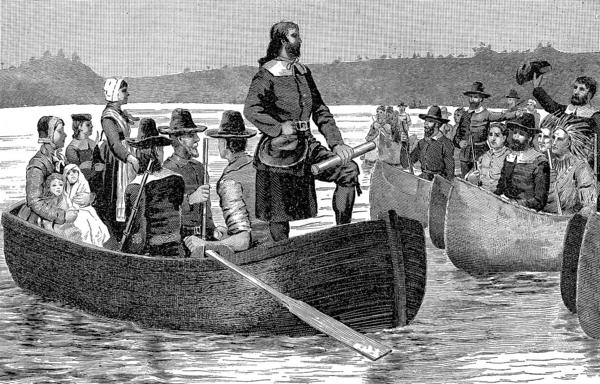Welcome to DU!
The truly grassroots left-of-center political community where regular people, not algorithms, drive the discussions and set the standards.
Join the community:
Create a free account
Support DU (and get rid of ads!):
Become a Star Member
Latest Breaking News
Editorials & Other Articles
General Discussion
The DU Lounge
All Forums
Issue Forums
Culture Forums
Alliance Forums
Region Forums
Support Forums
Help & Search
Massachusetts
Related: About this forumBanned In (17th Century) Boston: Religious Tolerance
http://wgbhnews.org/post/banned-17th-century-boston-religious-tolerance
"Return of Roger Williams from England with the First Charter," 1644.
Banned In (17th Century) Boston: Religious Tolerance
By Edgar B. Herwick III
Just how Puritan was early colonial New England? The first legal code, The Body of Liberties, was written by a minister.
Among the offenses that could get you put to death: worshipping another god, blaspheming, and committing adultery. Sure, the separation of church and state, and your right to religious freedom, are bedrocks of the American way of life today— but it hasn't always been like that.
"The Massachusetts government was almost a theocracy," said John Barry, author of "Roger Williams and the Birth of the America Soul." "Everybody in it believed that the goal of Massachusetts’s government was to fulfill God’s will."
It was this theocratic world that Roger Williams stepped into, when he arrived in Boston from England in the winter of 1631.
InfoView thread info, including edit history
TrashPut this thread in your Trash Can (My DU » Trash Can)
BookmarkAdd this thread to your Bookmarks (My DU » Bookmarks)
2 replies, 1431 views
ShareGet links to this post and/or share on social media
AlertAlert this post for a rule violation
PowersThere are no powers you can use on this post
EditCannot edit other people's posts
ReplyReply to this post
EditCannot edit other people's posts
Rec (1)
ReplyReply to this post
2 replies
 = new reply since forum marked as read
Highlight:
NoneDon't highlight anything
5 newestHighlight 5 most recent replies
= new reply since forum marked as read
Highlight:
NoneDon't highlight anything
5 newestHighlight 5 most recent replies
Banned In (17th Century) Boston: Religious Tolerance (Original Post)
unhappycamper
Oct 2015
OP
Demeter
(85,373 posts)1. And even today every religious outfit feels entitled to rule in MA
and the bad idea leaks out to other parts of the country.
The only religion of the Enlightenment: Unitarian Universalism, is a shadow of its former self, because it doesn't put boundaries around itself--
Unitarian Universalist congregations affirm and promote seven Principles, which we hold as strong values and moral guides. We live out these Principles within a “living tradition” of wisdom and spirituality, drawn from sources as diverse as science, poetry, scripture, and personal experience.
As Rev. Barbara Wells ten Hove explains, “The Principles are not dogma or doctrine, but rather a guide for those of us who choose to join and participate in Unitarian Universalist religious communities.”
1st Principle: The inherent worth and dignity of every person;
2nd Principle: Justice, equity and compassion in human relations;
3rd Principle: Acceptance of one another and encouragement to spiritual growth in our congregations;
4th Principle: A free and responsible search for truth and meaning;
5th Principle: The right of conscience and the use of the democratic process within our congregations and in society at large;
6th Principle: The goal of world community with peace, liberty, and justice for all;
7th Principle: Respect for the interdependent web of all existence of which we are a part.
The seven Principles and six Sources of the Unitarian Universalist Association grew out of the grassroots of our communities, were affirmed democratically, and are part of who we are. Read them as they are written in our UUA Bylaws.
http://www.uua.org/beliefs/what-we-believe/principles
As Rev. Barbara Wells ten Hove explains, “The Principles are not dogma or doctrine, but rather a guide for those of us who choose to join and participate in Unitarian Universalist religious communities.”
1st Principle: The inherent worth and dignity of every person;
2nd Principle: Justice, equity and compassion in human relations;
3rd Principle: Acceptance of one another and encouragement to spiritual growth in our congregations;
4th Principle: A free and responsible search for truth and meaning;
5th Principle: The right of conscience and the use of the democratic process within our congregations and in society at large;
6th Principle: The goal of world community with peace, liberty, and justice for all;
7th Principle: Respect for the interdependent web of all existence of which we are a part.
The seven Principles and six Sources of the Unitarian Universalist Association grew out of the grassroots of our communities, were affirmed democratically, and are part of who we are. Read them as they are written in our UUA Bylaws.
http://www.uua.org/beliefs/what-we-believe/principles
MisterP
(23,730 posts)2. hmm, UU's development had much more to do with Victorian shifts
and I may add that all the Congregationalist Founders thought of themselves as tip-top Enlightened: even their effort to ban Papists was the peak of Enlightenment, and many would've agreed